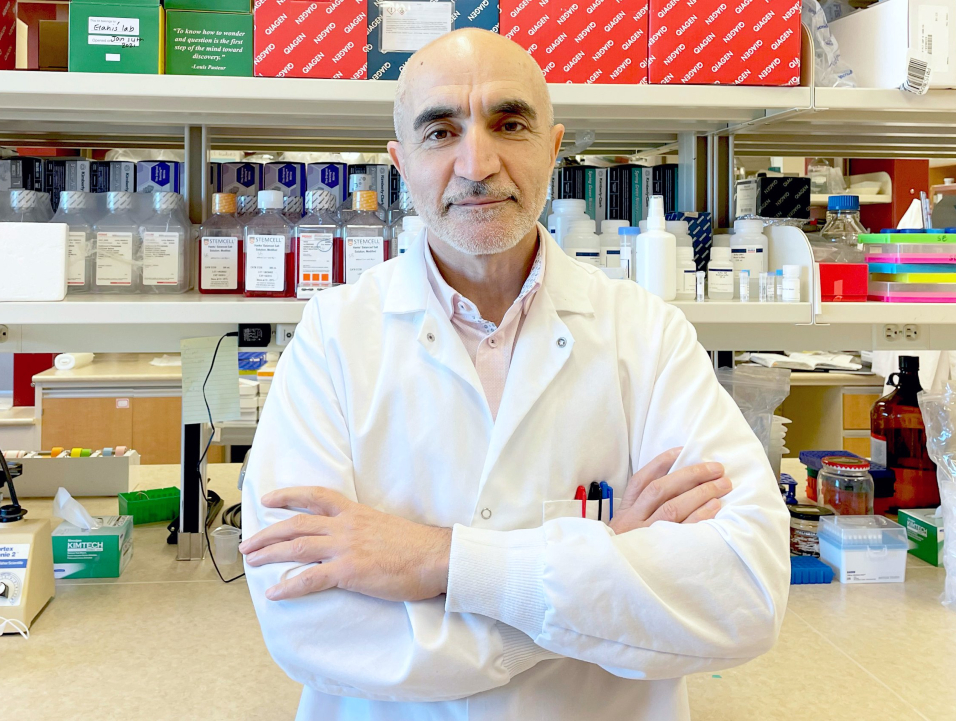U of A study pinpoints role of specialized cells in baby gut health
Jon Pullin - 30 July 2024

Shokrollah Elahi
A new University of Alberta study is bringing understanding to the role of specialized cells in promoting gut health during pregnancy and the neonatal period.
The study, spearheaded by School of Dentistry professor and immunologist Shokrollah Elahi, shows how these specific cells support a balanced gut microbiome, which is vital for immune system development and overall health in newborn babies.
Understanding the study
“Gut microbiota, which consists of trillions of micro-organisms living in our digestive tract, play an essential role in the development of a healthy immune system, especially during early life,” says Elahi.
“When babies are born, they’re exposed to many different types of microbes which colonize their bodies. These microbiota, especially those in the gut, are important for helping the baby develop a strong immune system. This exposure is important for establishing a balanced relationship between the baby and these micro-organisms”.
If this microbe-immune system balance is disrupted, it can cause a condition known as dysbiosis, which can lead to problems like inflammatory bowel disease, Type 1 diabetes and asthma. It can also lead to a serious gut disease called necrotizing enterocolitis, which can cause parts of the intestine to become inflamed and die.
“While it is known that gut microbiota play a crucial role in early immune system development, the exact mechanisms are not well understood. Our study aimed to understand how a healthy balance of gut microbiota and the immune system is maintained in babies to prevent these diseases,” says Elahi.
Key findings
The research team found that a type of red blood cell precursors known as CD71+ erythroid cells, or CECs, help manage the body’s immune response to the influx of gut bacteria that occurs at birth. These CECs are abundant in the small intestines of babies, but not in adults.
"We discovered that these CECs in the intestines of newborns have unique features that prevent inflammation and help beneficial bacteria flourish," says Elahi. “These cells maintain a stable and healthy microbial community. They also promote the secretion of natural antibiotics called antimicrobial peptides in the gut, which are essential for eliminating harmful bacteria.”
The study showed that these CECs increase in numbers during pregnancy. Removing CECs led to a rise in harmful bacteria and inflammation, adding further evidence of their role.
Premature babies had significantly lower levels of CECs in their umbilical cord blood, suggesting a potential link to being born before 37 weeks and gut health issues.
Researchers also found that the mother's microbiota impacts the development of CECs in the baby, highlighting the importance of maternal health on newborns. "Our findings demonstrate that what happens in the mother's body can affect the baby's immune system, providing insights into promoting healthy immune development," notes Elahi.
Why it matters
A healthy gut microbiome is essential for immune development and overall health in newborns. Disruptions in this balance, known as symbiosis, can lead to inflammatory diseases and other health issues.
“We found that the absence of CECs early in life, especially in premature births, can have long-lasting effects, potentially leading to dysbiosis which can persist into adulthood,” says Elahi.
By understanding how CECs contribute to maintaining this balance, researchers hope to find new ways to prevent and treat gut-related conditions. "Learning how these special immune cells work in newborns can help us ensure that babies get a strong start with a healthy immune system, which can protect them from inflammatory conditions and other illnesses early on," Elahi says.
This finding could lead to new strategies to support the health of premature babies by targeting and enhancing CEC function.
The study also reinforces the importance of maternal health and its direct impact on newborns. “Taking care of a mother’s health during pregnancy directly benefits the baby’s immune development, and knowing this can help us create better health guidelines for pregnant women,” explains Elahi.
Also of note, the researchers observed gender differences in CEC function, which could explain why certain health issues affect men and women differently. This understanding may guide more personalized treatments based on gender.
“In simple terms, these findings are significant because they help us understand how to support the health of babies from the very beginning, demonstrate the important connection between a mother’s health and her baby’s health, and offer new ways to prevent and treat gut and immune problems throughout life,” concludes Elahi.
Next steps
Looking ahead, Elahi and his team plan to look deeper into how a mother's microbiota influences the development of CECs in her baby. They aim to pinpoint specific bacteria and their byproducts that are most beneficial. Further studies will explore the molecular and cellular mechanisms through which CECs communicate with other immune cells in the gut.
Long-term research will monitor children over several years to understand how early-life changes in CECs impact their immune system and gut health in the long run.
In clinical settings, the team hopes to develop new treatments for gut and immune-related conditions by improving CEC function in newborns. This could include probiotics, prebiotics or other treatments designed to boost the beneficial effects of CECs. Additionally, there are plans to explore personalized medical approaches based on gender, focusing on how hormones influence CECs and immune responses.
"Our research has the potential to improve health recommendations and treatments for both mothers and their children," says Elahi.
Shokrollah Elahi is a member of the Cancer Research Institute of Northern Alberta, the Women and Children's Health Research Institute, Li Ka Shing Institute of Virology, Glycomics Institute of Alberta and the Alberta Transplant Institute.
This study was supported by funding from the Canadian Institutes of Health Research and the Stollery Children’s Hospital Foundation through the Women and Children’s Health Research Institute.